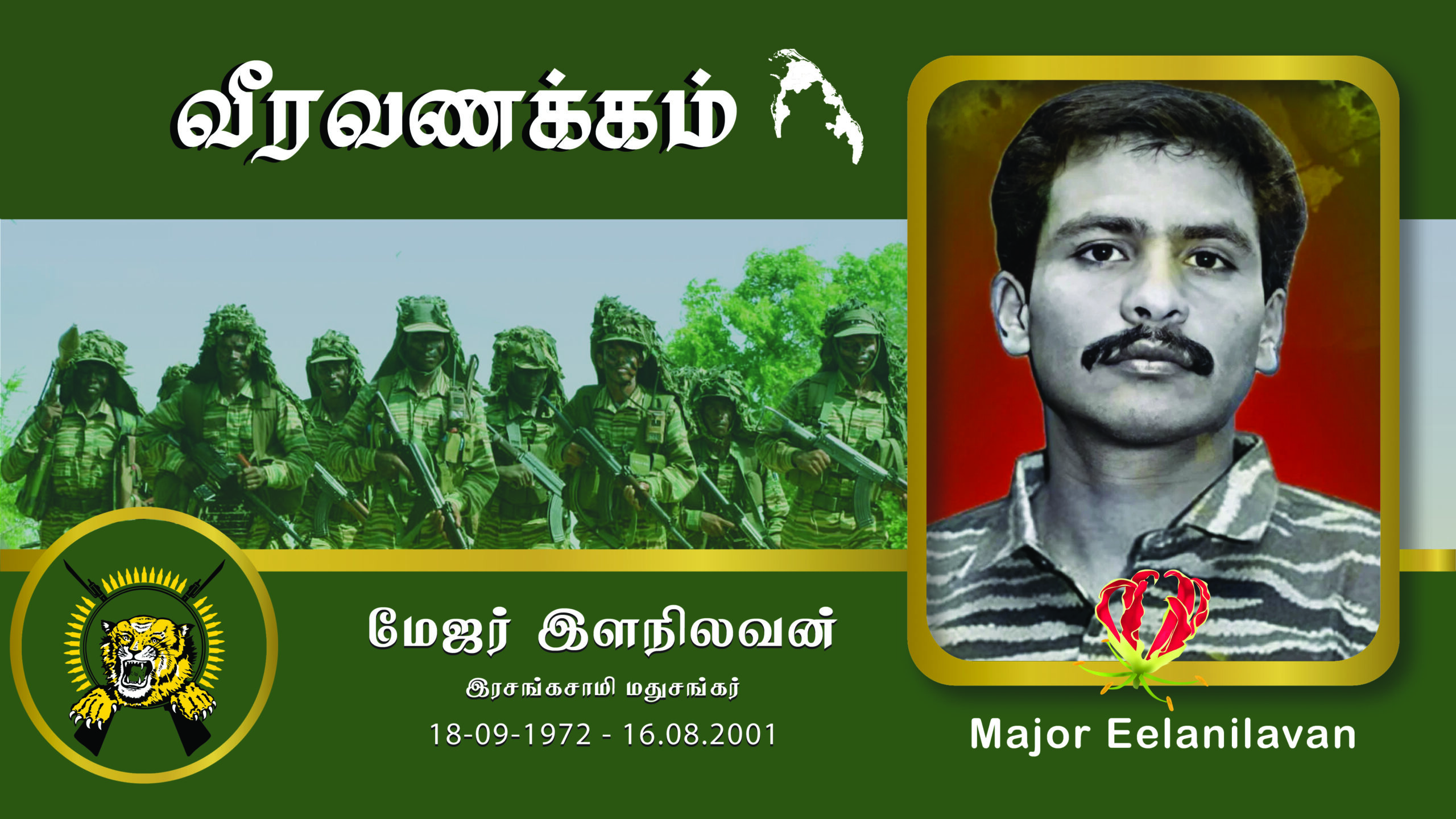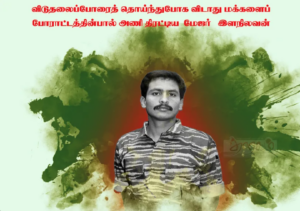

Major Eelanilavan

Major Eelanilavan – the man who gathered the people for the cause of the freedom fight. 16.08.2001
“A beggar’s stomach, a simple burden, strong legs that have risen.” These are the qualities a guerrilla fighter must embody. These words come from the heart of the world’s greatest freedom fighter, Che Guevara. As I read this, the figure that came to mind was Nilavan.
He has wandered through the forests of Vanni, relying only on a rag tied around his waist to carry his belongings. He never allowed the freedom struggle to wane, and in his mission to unite the people, he traveled by bicycle to every corner of Vanni. In times when his meals consisted of kanji and aubergine, he was among those fighters who filled their stomachs with whatever they could find. Despite all the hardships, he grew stronger, his spirit and resilience only growing through the struggles he faced.
He has a round face and fair skin. His hair is always neatly kept. Of average height, he only appears calm when he ponders, absentmindedly rolling the small mole on his right cheek as he reads. At all other times, he is energetic and full of life.
A significant part of Nilavan’s life in the struggle was spent at the training camps, where he mentored and shaped new fighters. While he undertook many different roles, this particular responsibility is the one I feel compelled to emphasize the most. The reason for this is that the work he did at the training camps played a crucial role in the development of our armed struggle at that time. The battlefield in Vanni was tight and intense. Every day, more than ten fighters were injured or martyred and removed from the frontlines. Yet, the war continued to escalate. During this period, it was not only necessary to replace the fighters lost in battle but also to form additional units. In such a critical time, Nilavan’s contribution at our training camps, where he quickly transformed recruits into clear-headed, determined, and brave warriors, was invaluable.
The world within the forests was a different one. It was a life full of a bittersweet mixture of pain and pleasure. The fighters, who had just left their families, would experience some of the most difficult moments of their lives in the wilderness.
In those times, each one of them would be haunted by memories of their loved ones: the mother they had left behind, whose face would suddenly appear in their mind, the image of their dignified father shedding tears, the brothers they had been separated from, and the lives they had shared with their friends. They would be consumed with grief from the things they had left behind. Torn between the loss of what they had once known and the new ideals they were fighting for, they continued to struggle. In such moments, Nilavan stood beside countless fighters, offering his support and strength.
Nilavan was not only a trainer at the camps but also a mentor, a sportsman, a cook, an artist, a technical expert, and even a library that fed the fighters’ thirst for knowledge. In every role, he was a charismatic teacher, embodying all these qualities. His remarkable ability to perform these tasks stemmed from his inherent nature. Nilavan was the eldest son in his family, with three younger sisters. During his time at home, two of his sisters had already gone off to fight. This responsibility, combined with his deep sense of love and duty, shaped him into someone who would show love and care for others.
His family, originally from the Trincomalee area, had moved across much of Tamil Eelam and even had to relocate to India. This experience of migration and the exposure to different communities gave Nilavan a broad perspective on life. His parents, determined to provide the best education for their only son despite the hardships, made sure that he received a solid education. His family’s natural involvement in social causes and his love for reading also deeply impacted him. Nilavan was well-versed in politics and had a rich understanding of science, both of which shaped his worldview.
Nilavan’s role as an educator did not remain confined to the training camps alone. From the early days when a fighter first joined, Nilavan would remain in the trenches, continuously moving from the front lines of the battlefield. The ever-changing battlefield conditions, where fighters were required to adapt quickly to new and challenging environments, made his role as a trainer even more vital. He was the teacher who would seek out the fighters he had trained and guide them through the expansive battlefields of Vanni. During that period, the main means of transport we used was the “Annai Varatto,” which translates to “Brother, can I tag along?” This was a practice where fighters would ask for a ride from any vehicle passing by, but in the battlefields of Vanni, it was impossible to reach by any vehicle. The terrain was so harsh that most travel had to be done on foot, and often, the distances were covered in remote areas, far from the convenience of public transport. Nilavan, during such times, worked relentlessly without rest.
Although Nilavan was deeply committed to his duties, he also endured immense emotional pain and struggles. I have often witnessed him working through these tormenting feelings. Whenever the fighters he had trained would fall in battle or lose their lives in a short period, Nilavan would be consumed with sorrow. The bond he shared with each fighter, beyond the simple pain of death, deepened his suffering.
Many fighters found a space to share their personal grief with Nilavan. Those who were close to him would know how he would console them and carry their burdens. His heart, shaped by such compassion, led him to take on yet another role beyond his work as a trainer—he would visit the families of fallen fighters, offering them comfort and solace. As a result, the distance he traveled to fulfill this role grew even further.
His strong legs tirelessly carried him wherever needed. His gentle heart bore the weight of profound sorrows. He was not just a warrior who operated with weapons but also a fighter who bore the emotional burdens of others. I don’t know if Nilavan had any “magic” that could erase his pain, but I do know that he would internalize everything, burying it deep within. And so, when there was any battle, he would fight to reach the front lines, seeking opportunities to contribute. Through this, he earned many chances and responsibilities.
 Whenever Nilavan arrived at the camp, there was always a sense of excitement. If he was around, there would be good food, lively conversations, and healthy exchanges. He was like a magical vessel that gave everything. At that time, we were staying at a camp for training, and to us, Nilavan was an older brother. He was the oldest among us, not only by age but also by wisdom and experience. He was the one who gave us comfort and advice during those times.
Whenever Nilavan arrived at the camp, there was always a sense of excitement. If he was around, there would be good food, lively conversations, and healthy exchanges. He was like a magical vessel that gave everything. At that time, we were staying at a camp for training, and to us, Nilavan was an older brother. He was the oldest among us, not only by age but also by wisdom and experience. He was the one who gave us comfort and advice during those times.
That period was especially difficult, with food being scarce and hard to come by. Meals often began with the bitter, hard-to-eat kanji (rice porridge), and it was a struggle to get through three meals a day. Nilavan taught us how to enhance the taste of food with locally available ingredients. For the morning kanji, he would grind spices in leaf bowls and mix in juice from the panam fruit to add flavor. He also brought back meat from hunting, which he would turn into flavorful curries that we had never tasted before. Those who knew him as a cook would certainly remember Nilavan as a culinary genius.
Nilavan’s growth during the six years of the struggle was remarkable. His experiences had matured him into a seasoned individual, one who had dealt with countless human emotions. He had become a trusted figure for his leader, a person who could carry out the responsibility of any role that came his way.
By 2001, after the completion of “Unyielding Waves – 03,” enemy activities had escalated on the northern front. Behind the firewalls, the resistance movement continued its struggle. From the political field, fighters were gathered to form a fighting unit. It was at this point that Nilavan was called by the political leader to take on a new responsibility. He was immediately appointed as the leader of the unit and went to the frontlines. The plan was to quickly conclude the enemy’s offensive and then regroup the fighters for future missions.
The battlefield was being prepared for a major confrontation. As always, Nilavan worked tirelessly. On the morning of August 16, 2001, with a loud roar, shells began falling heavily on our positions. A fierce artillery battle erupted between us and the enemy. The fighters had been expecting the enemy’s assault. However, after a short time, the noise subsided. The enemy abandoned their plan of advancing. All of our soldiers remained unharmed, except for Nilavan. When the news reached our camp, everyone stood in shock, while the bicycle that had arrived just a few days earlier, which had been the only companion of that tireless worker, cried out in silence.
– Liberation Tigers Magazine, Issue 120 –
Translation by Hari
![]()
– விடுதலைப் புலிகள் இதழ் 120 –